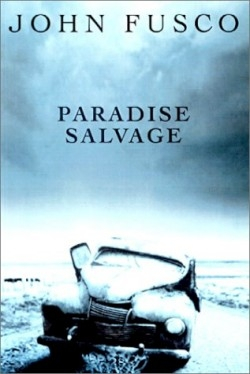Paradise Salvage
Twelve-year-old Nunzio Paradiso is sprawled beneath a wrecked 1973 Pontiac Bonneville, hooking it up for towing, when he hears someone speak in Italian.
“Dio,” the voice says. A moment later it comes again. “Dio.”
The explanation for the mysterious voice is revealed later, when Nunzio looks in the trunk of the wrecked car and finds a man in the throes of death. Stunned, Nunzio tries to call attention to the body, but he is a boy in an adult’s world and the car and its contents are sent through a crusher before he has a chance to alert anyone willing to listen. There it stays for the rest of the summer of 1979; a crushed body in a crushed car in a heap of crushed cars at Paradise Salvage, the family junkyard in Saukiwog Mills, Connecticut. It is the last summer of Nunzio’s childhood, and he comes of age against the backdrop of corruption, dark secrets, and the unrelenting presence of the corpse in the junkyard.
The author is a high school dropout who later earned his GED, went to college, and became a professional screenwriter. As a student at New York University, he won the prestigious FOCUS Award for Best Screenplay for his movie Crossroads. His screenplay credits also include Young Guns and Thunderheart. This is his first novel.
Nunzio, in whose voice the novel is written, is surrounded by a large extended family of colorful and fully imagined Italian-Americans, plus a Scottish-American mother who tries to live up to the family’s exacting standards for marinara. His father is a tough and enigmatic businessman who finds gold in other people’s trash. His grandfather is an inventor who haunts the junkyard like a comic ghost, producing industrial-sized versions of household products like weed trimmers. His older brother, Danny Boy, is a former high school football hero whose character is clouded by his failure of nerve at a crucial moment.
There are aunts, uncles, godfathers, and neighbors from whose gardens and kitchens waft Italian phrases and the smells of freshly baked bread, olive oil, homemade red wine, antipasti, and espresso brewed so carefully that its fans seemed to ascend to hallucinatory heights after drinking it.
Although the ethnic atmospherics, complete with family meals and visits to the seashore, provide some relief from the foreboding that hangs over Nunzio’s life, there are times when they contribute to the darkness. Danny Boy, in an attempt to cast off the affliction that ended his football career, has his grandmother, Nonni, expunge the evil spirit and cap it inside a bottle with oil and water, where it festers and ferments and turns the bottle warm to the touch.
Nunzio inhabits also the American mainstream boyhood, the language and sensibilities of which Fusco captures with ease.
“I got up and gave Eddie a tentative hug—heavy on the backslaps to make sure we weren’t queers—then left him alone with his Dallas Cowboys banners and his glow-in-the-dark Led Zeppelin poster.
‘Hey Nunz,’ he moped as I headed out. ‘Sucks the moose you have to work this summer.’
‘Yeah. Sucks the moose.’“
Danny Boy is the first to come to Nunzio’s side in exposing the evil at work in Saukiwog. Then comes the help of Angelo, one of Nunzio’s three godfathers and the black sheep of the family. Angelo is an ex-cop who made a mistake that cost him his career and the love of his family. Corrupt, bitter, and cruel, he retains a razor-sharp shrewdness that sees through the distorted facts of the mystery right to the public corruption at its heart.
The two main genres Fusco mixes in his novel—the coming-of-age story and the crime thriller—sometimes battle for supremacy. There are scenes, like the brief goodbye scene with Eddie, that flesh out Nunzio’s character but do nothing to advance the plot. Also, there are times—the sudden revelation during a car chase that Nunzio’s grandfather had equipped a car with boat propellers, for instance—when gritty realism seems to have been sacrificed to keep things moving.
Fusco is masterful at conjuring up settings, whether it’s a kitchen on a Sunday morning with scent of garlic and onion in the air or a dingy bar at night where Nunzio and Danny Boy enter to the strains of K.C. and the Sunshine Band singing, “That’s the way I like it, uh-huh, uh-huh, I like it.”
Reviewed by
Rich Wertz
Disclosure: This article is not an endorsement, but a review. The publisher of this book provided free copies of the book to have their book reviewed by a professional reviewer. No fee was paid by the publisher for this review. Foreword Reviews only recommends books that we love. Foreword Magazine, Inc. is disclosing this in accordance with the Federal Trade Commission’s 16 CFR, Part 255.

